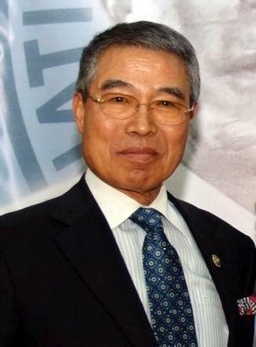THE 2nd of July 1967 was the entry into Great Britain of a young Korean who was to
change the face of British martial arts forever. He brought with him a new martial
art that very few people in this country had ever heard of. That name is now as well
known in Great Britain as Karate. The name of the martial art was Taekwon-Do and
that then young Korean is First Grand Master Rhee Ki Ha, 9th Degree.
The following is an extract from an interview of the then Master Rhee Ki Ha 8th degree,
conducted by Fighters Magazine in July 1992. "When I was a kiddy there was no Taekwon-Do
at all.
As you know, in Korean history we were all under the Japanese empire for more than
36 years. My father did Judo and I followed him, learning the basic Judo movements.
I got nicknamed ‘Tdun Tdun Bo’ meaning Double body because Judo people tended to be
large. I did not like being called names, but I still liked to carry on doing some
self defence martial art. "Then one day my primary school teacher showed me something,
because he went to Japan to study and he learned some movements. So that is how
it started, nothing serious. So rather than follow my father in Judo, I wanted to
keep a little slimmer figure than Judo, allowed." Master Rhee started with Taekwon-Do
when he did his military national service. All soldiers had to learn Taekwon-Do,
it was part of their training.
After basic training people with high IQs were sent to the signals corps. The other
top people had an option of what they would like to do. Master Rhee's choice was
to study Taekwon-Do which surprised his superiors, and he was asked if that was
really what he wanted to do, because at that time military food was very poor and
soldiers were always hungry; almost a starving situation, but still when he was offered
other options he said he wanted to do Taekwon-Do. Master Rhee stated: "I do not regret
it, it was tough, but I continued to do Taekwon-Do."
I then asked Master Rhee about what training devices, like the leg stretchers we
Have today, they had available to them. "Taekwon-Do originated from Korea, so Korean
people and Korean living systems and environments were a little bit different. In
my experience in Western society it is much easier and comfortable. So when I start
teaching Royal Air Force or Police Cadets, they are physically quite fit and strong,
but surprisingly their ankles, knees and shoulders are not as solid to develop as
a powerful weapon. I have seen it, during the war, jumping over boulders, ankles
twist, and knee problems. So warming up and stretching is quite important before
doing anything, because Taekwon-Do movements are physical fitness movements.
The whole body performs, concentrating on producing maximum power as a human weapon.
Master Rhee then told me how he came over here and how Taekwon-Do developed. When
he was teaching in Malaysia and Singapore, RAF Changee was headquarters for the British
Air Force and so when the members of the air force return to Britain they do not
all get posted to one place, but all over the country from Newquay to Kinloss.
They wrote to him and as one stated all they can do is to go to the local Karate
class, but they feel they are already college graduates and do not want to go back
to primary school and they asked Master Rhee to come to Britain because they wanted
to continue. When he came over he was based near Coventry, so he was central in the
country. He basically operated at RAF Gaydon, whose gym he used as the weekend training
base so everybody could travel to a central base. When he travelled around the country
teaching it was not quite as easy as it is now, as the only motorway was the Ml ,
and he travelled from the south coast up to Scotland and from Wales to East Anglia.
Master Rhee was the first pioneer Taekwon-Do instructor to leave Korea in 1964. Others
left Korea before Master Rhee, but they did not go out as official instructors. Master
Rhee's passport stated his occupation was a Taekwon-Do instructor, so he was the
first in Korean history to leave Korea as such. Taekwon-Do was developed for five
years and it was here in Europe, and some instructors had been travelling in the
Middle East and South Africa and then, unfortunately, in Korea a second Organisation
started. Master Rhee states that he is not bothered about the names of the bodies,
what concerns him is how Taekwon-Do can be unified or united so it can develop. When
he first came to this part of the world no one knew what Taekwon-Do was and even
during the last decade he got asked by an interviewer and reporters questions like
"is Taekwon-Do the name of a race horse?"
That does not happen now as many more people know about Taekwon-Do. He agrees that
the '88 Olympics has done a lot of good for the publicity of Taekwon-Do and the '92
Barcelona Olympics exhibition will also help with the publicity. Master Rhee wants
to see Taekwon-Do unified so it can have credibility as it spreads so everyone has
to think about it, and put the politics and egos away, in order for this to happen
for the good of Taekwon-Do and everyone involved in it. When he first arrived karate
was quite well known, and Master Rhee was introduced to the BKCC. He asked what that
meant and he was told the British Karate Control Commission. They thought that Taekwon-Do
was another style, or kind of Karate, so he had to explain to them that they could
not just treat Taekwon-Do as another style of Karate. All they said was there was
Japanese style of karate, Korean style of karate, Chinese style of karate.
So Master Rhee explained the difference by saying as the Japanese Embassy in London
was a big building, and the Korean Embassy was a small terraced house, would the
chairman of the BKCC go to the Korean Ambassador and ask him to affiliate themselves
with the Japanese Embassy, because they are so small and not well known. He was immediately
told that they could not do that because they were different countries. So Master
Rhee got his point across very well that all martial arts cannot just be lumped together
under the heading of Karate. He had to explain about Taekwon-Do and that it was invented
by General Choi Hong Hi, so officially the name had been given on 1lth April, 1955.
Also that all the techniques, terminology, system and rules are different and the
culture it comes from.
Master Rhee stated that if they wanted him to join they had to open the door a bit
wider than Karate. He could not join under the name of karate, but he could under
the term martial arts.
I then asked Master Rhee were he saw the future of Taekwon-Do. He answered by saying
that he is only a pioneering master. General Choi was the founder and he had asked
General Choi on several occasions which way he favoured the development of Taekwon-Do
but as yet had not had a definite answer. Whatever General Choi decides he, Master
Rhee, will support.
Master Rhee's own personal view is that he is proud of Taekwon-Do as a self discipline,
a self challenge, but these days half the students studying Taekwon-Do in Great Britain
are juniors (under 18s) and in some schools it is over half. So you have to let these
"children" have their enjoyment so you have to have a competition/tournament side
to Taekwon-Do.
The important thing is, though, not to let it take over Taekwon-Do, but to run along
side the traditional part of Taekwon-Do, so it complements it. Master Rhee, though,
is not totally satisfied with the safety of the tournament rules, because every tournament
he goes to he does not feel comfortable. As an example of this Master Rhee said that
boxing has been an Olympic sport for many years, but there are still serious injuries
(and even fatalities) in the sport which is against the principle of the games, and
this happens when a boxer is only using his fists wearing gloves. So what can happen
when you can use your legs as well, which are bigger and longer than your arms and
hands.
With the training in Taekwon-Do your legs can be two or three times more devastating
than hand techniques. So Master Rhee cannot see how Taekwon-Do -can be accepted as
an Olympic sport. With boxers only using their fists and wearing head guards, doing
internal damage, what damage will legs twice or three times more powerful do. So
Master Rhee feels that a lot more research and development has to go into discovering
how Taekwon-Do can be a competitive sport.
One of the ways Master Rhee feels that the competitive side of Taekwon-Do could go,
which would include something like a gymnastics floor exercise and a power gauge,
and with sparring the people wearing body protectors with some sort of touch sensors
like those used in fencing, but without the wire attracted, because fencers only
go back and forward unlike Taekwon-Do competitors. From this base you can then state
what techniques are allowed and what areas score.
So as to the way Taekwon-Do will go Master Rhee says: "Everyone has to survey and
listen as to which way is the best way to develop and benefit and be a credit to
Taekwon-Do."
Master Rhee is now a grandfather and he now plays golf. One thing he regrets is that
he did not take up golf earlier, because golf is a very disciplined sport. He plays
not to beat anybody but the course and to improve his handicap. Master Rhee finds
that golf is like Taekwon-Do; there is always something to achieve. It is a self
discipline, a self challenge.






